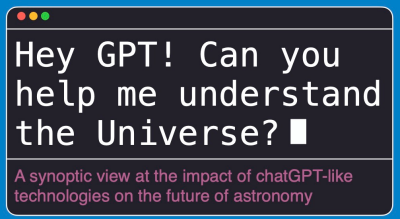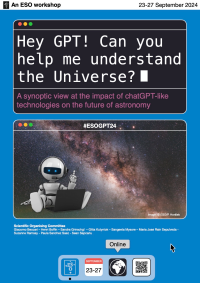
ESO on-line event – 23 to 27 September 2024
-- Programme Released --
The event will be streamed Live on YouTube
Please subscribe to the dedicated YouTube channel to be notificatified every time a new live-stream starts
Scientific Rationale - Summary & Motivation
The technology around Artificial Intelligence (AI) has nowadays achieved remarkable performances in terms of speed, response quality, affordability to the public and reliability. The use of AI technologies will soon (if not already!) play a significant role in the way scientists, and astronomers in particular, process data, write and evaluate applications of all sorts (research grants, observing proposals, job applications), or more generally, the way we do research in astronomy. Beyond the impact on the way we do science, AI might have a non-negligible sociological impact, overtaking some of the tasks currently requiring human intervention, hence removing or mitigating the need of a variety of skills (e.g., programming, peer-review and evaluations, administrative tasks).
This is particularly true when considering generative AI and large language models (LLM) like the generative pre-trained transformer (GPT) language, which has been growing exponentially in recent years.
The public discovered the immense potential of artificial intelligence systems at the end of 2022 with the release of the ChatGPT editorial content generator from the Californian company OpenAI, which can write original essays, poems, or translations in a few seconds. Soon, software engineers and scientists were considering using it for their work. Also, ChatGPT became successful so quickly that many journals were forced to release formal rules to make it clear that ChatGPT or the likes could not be co-authors of papers.
Given the speed at which such technology grows and enters our scientific (and personal) life, it is imperative to have a deep look into them with the help of experts in the field of astronomy, physics, software development, economy, sociology, and medicine.
- An on-line event -
With this on-line workshop we invite experts with a diverse set of professional skills to help the astronomical community to gather a deeper understating of what GPT-like language models mean and discuss on the impact of the use of AI on astronomy. We aim to host talks from software developers with the scope of having an in-depth look into the present and future status of the technology. Sociologists, economists, and likely neuroscientists will help us to discuss the potential impact of the use of AI and GPT language models on the cognitive skills of researchers at any career stage with focus on the potential future transformations on the way astronomy and science in general is done.
We will give every day ample space for discussions. In order to make the involvement of on-line participants more effective, the SOC will have the mandate to trigger on-line pools, chair online roundtables on specific topics of interest, proposed and voted by the participants before the start of the conference. Finally, we aim at publishing the outcome of different discussions on a White Paper that might serve as a milestone for future reflections on the impact of GPT-like technologies on astronomy.
The workshop will be hosted on-line and live streamed. More information will be given once the registration will open.
Conference email: esogpt24@eso.org
Quick links
- Home
- Important dates
- SOC/LOC
- Invited speakers
- Code of conduct & Chair Guidelines
- Registration
- Registration fee payment
- Questions and Comments
- Programme [Zenodo]
- Presentation guidelines
- Guidelines for talks
- Online tools

